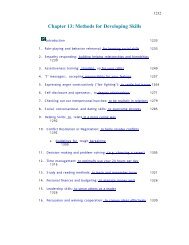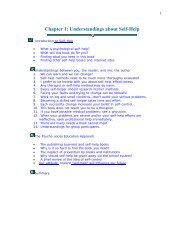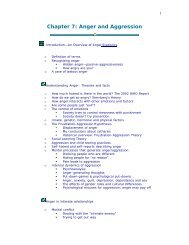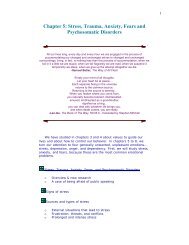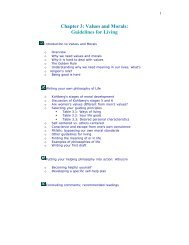Methods for Changing Behaviors - Psychological Self-Help
Methods for Changing Behaviors - Psychological Self-Help
Methods for Changing Behaviors - Psychological Self-Help
Create successful ePaper yourself
Turn your PDF publications into a flip-book with our unique Google optimized e-Paper software.
There are some advantages <strong>for</strong> covert conditioning: (1) the ideas<br />
are simple, (2) no help, no special environment, and no equipment is<br />
needed, (3) there are almost no limits to what can be done in fantasy-<br />
-vomiting, instant sex of any kind, vacations, hurting oneself, etc., and<br />
(4) it can be done anytime (since your head is almost always with<br />
you). But does it work?<br />
The research centers on covert sensitization. It has worked fairly<br />
well with sexual deviations (homosexuality, exhibitionists, incest) but<br />
not very well with obesity, alcohol, or smoking (Bellack and Hersen,<br />
1977). More research is needed with the other covert methods.<br />
The results are promising enough to try these methods, especially<br />
if the approach has an appeal to you and is believable. Remember the<br />
research thus far has been done with long-term clinical disorders, not<br />
ordinary problems.<br />
Additional readings<br />
Cautela, J. R. Covert conditioning. In A. Jacobs & L. Sachs<br />
(Eds.), The psychology of private events. New York: Academic<br />
Press, 1971.<br />
Extinction; making sure the behavior doesn’t pay off<br />
If a behavior yields no pay off, it should gradually stop, i.e. be<br />
extinguished. Thus, it is sometimes better to disregard an unwanted<br />
response than to punish it. Extinction and punishment lead to the<br />
same results: stopping some behavior. However, in extinction the<br />
unwanted response is allowed to occur freely. The person learns "this<br />
behavior just doesn't work; it gets no results at all." Note the striking<br />
contrast with the person whose behavior is punished by someone else,<br />
the punishee might think, "Wow, they (the punishers) are really upset.<br />
Well, maybe I'll cool it while they are around but I know how to drive<br />
them crazy if I ever want to. I'm powerful!"<br />
In this method, we remove the rein<strong>for</strong>cement of unwanted<br />
behavior, but the neglect of good, desired behavior (that's extinction<br />
too) is the source of many problems in the world. Parents and teachers<br />
attend far more to bad than to good behavior; we <strong>for</strong>get to tell the<br />
people closest to us that we love and appreciate them; we take our<br />
own good behavior <strong>for</strong> granted but get upset by failures, etc. Thinking<br />
by the brain is required <strong>for</strong> rein<strong>for</strong>cement and <strong>for</strong> extinction (where<br />
you have to think, "I'm not going to respond to this."<br />
Purposes<br />
· To stop or reduce an unwanted behavior.<br />
· To do the above without harsh, unpleasant punishment.<br />
1150




